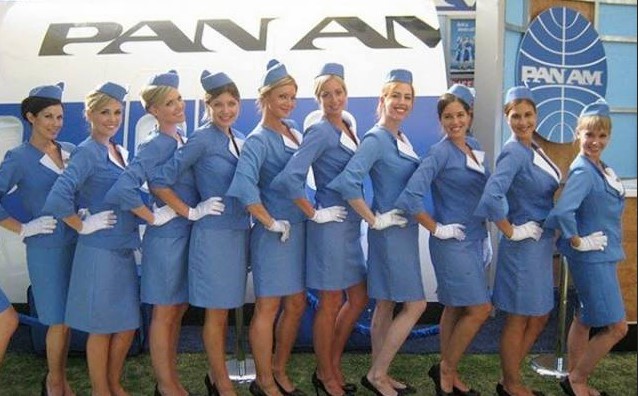I’m not going to argue with the genius of Juan Trippe, the late head of Pan Am (as discussed in last night’s homework assignment). But the problem with genius is that it can overstretch itself, which is what happened to Trippe, and that had dire consequences for Pan Am.
But first, it’s time for yet another one of Kim’s Supermarket Stories (and I promise it has relevance).
I once worked for a chain which prided itself on the quality of its product — not only the merchandise, but the service of its customers. The Produce Department (Fruit & Veg to non-Murkin Readers) was as good as any “street market” or “farmer’s market”, for the simple reason that the store merchandisers tossed out a tremendous amount of any produce items which they judged sub-standard or even close to going “off” before they ever set it out on the shelves, in the bins, fridges or displays. The result was that you could pick any item off the display stand, and had no need to check it because you just knew that it had passed a stringent quality test. And the same was true of every department: (on-site) bakery, meat department, deli and so on. As a result, our average basket cost a little more than our competitors’, but then again, our typical shopper belonged to a higher income bracket: the kind who value quality over price and expect the best. Our average household, therefore, usually consisted of a high-earning husband/wife with teenage kids, who lived in the upper-middle class suburbs where (surprise surprise) 95% of our stores were located.
I was at the time the senior marketing manager for the chain — ran the loyalty program, worked with the Advertising department, worked with Purchasing on product selection and so on.
Then we had a huge management change: new CEO, new COO and new CFO. When I went to the first “welcome” meeting, the new CEO announced, without any fanfare, that our chain would henceforth be aiming for the lower segment of customers: younger moms with small kids, more “efnic” shoppers, and so on. After the meeting, I managed to get a one-on-one with the new CEO, and blew up at him.
- Had he discussed this with Purchasing? (because we’d have to start buying larger pack sizes, cheaper — perhaps lower-quality — products, which meant new shelf set design, and so on)
- Were all new stores going to be located in more down-market areas? (because our existing stores were not convenient to those areas)
- How were we going to compete with the multitude of competitive chains who had already staked out the “Every Day Low Price” (EDLP) position in the marketplace? (and we didn’t have the numbers to compete with the large existing chains, anyway)
- Had anyone looked at how this new strategy was going to affect our gross profits? (in our end of the market we had hardly any competition, ergo we could afford our higher prices for the quality)
- And why the fuck had I not been consulted on any of this? (because I had all the answers to the above questions).
To his credit, the new CEO didn’t fire me on the spot. But his lofty answer was that the board of directors had decided that we needed to “grow the business”, and as we had the upper end of the market more or less to ourselves, we needed to expand our customer base.
Which brings us back to Juan Trippe and Pan Am.
It’s clear that Pan Am had a quality product, and their clientele were not people who, let’s say, were at the bottom of the market. Their service was unparalleled, not only in the airline industry but anywhere, and it showed in all aspects of their business: hiring, training, equipment and cuisine.
Then Juan Trippe decided to “grow the business”, and open Pan Am up to the lower end of the market via mass-market people carriers like the Boeing 747.
I had always wondered why Pan Am ever, or could ever, have gone out of business. The YouTube video gave me all the answers. To be blunt, Pan Am went from “You can’t beat the experience… Pan Am!” to “We’re just another airline; check out our low prices.”
Their demise was as predictable as that of the above supermarket chain: both went out of business only a few years after making that calamitous decision to chase a new market.
Side note: I resigned a month after my meeting with the CEO.
Now, had I been Juan Trippe and wanted to “expand the market”, I would have done a couple things differently.
- Had the 747 jumbos built, but not flown them under the Pan Am logo, to include ground staff, cabin staff and maybe even pilots.
- Named the new budget airline “Dream Trippe” or something similar, and not have the 747s have first- or business class — basically, the economy-class seating (and service) would run from nose to tail.
- Kept the 707s going until the new sub-200-seat generation of airliners became available (e.g. the long-haul Airbus 220-300 or the “short” Boeing 757-100). Then turned them into first-/business class-only aircraft, using the traditional Pan Am staff and pilots, and maintaining the both the higher prices and the clientele who preferred the luxury service levels.
- Shared the existing Pan Am slots at airports between the two airlines.
That’s the basic idea of the thing, but you get my drift. It might not have worked and Pan Am might still not have made it. But they failed anyway, so how much worse could the outcome have been?
But at least they wouldn’t have screwed up their Pan Am brand, which was priceless. And the actual blowing up of the Pan Am brand was the entire responsibility of its founder.



